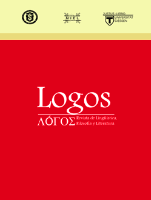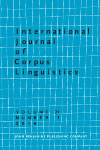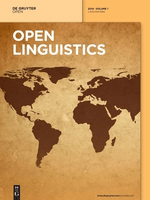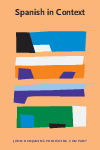
Logos-Revista de Linguistica Filosofia y Literatura
Scope & Guideline
Fostering Innovative Research Across Humanities Disciplines
Introduction
Aims and Scopes
- Linguistic Analysis and Discourse Studies:
The journal emphasizes the exploration of linguistic structures and their pragmatic functions, particularly in discourse contexts. This includes the study of discourse markers, modality, and lexical variations across different languages and cultures. - Philosophical Perspectives on Language:
It engages with philosophical inquiries related to language, such as the relationship between language and reality, and the implications of linguistic phenomena on human cognition and identity. - Cultural and Literary Studies:
The journal provides a platform for examining literary works and cultural narratives, investigating how language shapes and reflects social realities, ideologies, and movements. - Educational Linguistics:
Research related to language education, including pedagogical strategies, teacher perceptions, and the impact of language on learning processes, is a significant focus area. - Sociolinguistics and Language Ideologies:
The journal explores language use in social contexts, including studies on bilingualism, language policies, and the role of language in social movements and identity formation.
Trending and Emerging
- Discourse and Social Movements:
There is an increasing focus on the role of language in social movements, particularly in the context of migration and refugee narratives. This trend reflects a growing interest in how discourse shapes public perception and policy. - Multimodality in Communication:
Emerging studies on multimodal communication indicate a trend towards understanding how different modes of expression (visual, textual, auditory) interact within educational and social contexts. - Impact of Technology on Language Use:
Research examining the influence of digital communication tools and AI (like ChatGPT) on language practices is gaining traction, highlighting the relevance of technology in contemporary linguistics. - Intersection of Language and Identity:
There is a notable increase in studies exploring the interplay between language, identity, and culture, particularly in multilingual and multicultural contexts. - Critical Pedagogy and Language Education:
The journal is reflecting a growing interest in critical pedagogical approaches to language education, focusing on how educational practices can be informed by sociocultural dynamics and equity.
Declining or Waning
- Traditional Linguistic Structures:
There seems to be a decline in research focused solely on traditional linguistic structures without a broader context, as newer studies tend to integrate linguistic analysis with cultural or philosophical insights. - Historical Linguistics:
There is a noticeable reduction in papers centered specifically on historical linguistics or diachronic studies. The journal appears to be moving toward more contemporary and applied linguistics topics. - Static Language Ideologies:
Research that presents static views of language ideologies is less frequent. Instead, there is a trend towards dynamic and critical examinations of how language ideologies evolve within social contexts.
Similar Journals

International Journal of Corpus Linguistics
Fostering Collaboration in Linguistic ResearchThe International Journal of Corpus Linguistics, published by John Benjamins Publishing Co, is a premier academic journal dedicated to advancing the field of corpus linguistics. With an ISSN of 1384-6655 and an E-ISSN of 1569-9811, this journal serves as a pivotal platform for researchers and practitioners alike to explore the intricate relationships between language and corpora. Housed in the Netherlands and operating within the prestigious Q1 category in Linguistics and Language, the journal boasts impressive Scopus rankings, positioning it in the top percentiles of both Arts and Humanities and Social Sciences. Its commitment to rigorous peer-reviewed scholarship not only enhances understanding in the domain but also fosters collaboration among scholars. With coverage spanning from 1996 to 2024, the journal publishes cutting-edge research that contributes valuable insights into linguistic patterns and empirical studies. Whether you're an established researcher or a student embarking on your academic journey, the International Journal of Corpus Linguistics is an essential resource for anyone seeking to deepen their understanding of language through corpora.

LINGUA E STILE
Challenging Conventions, Enriching UnderstandingLINGUA E STILE, published by SOC ED IL MULINO, is a distinguished academic journal based in Italy that delves into the intricate realms of linguistics, literature, and philosophy. With an ISSN of 0024-385X, this journal has been a vital platform for scholarly discourse since its inception, covering a broad spectrum of topics from linguistic theory to literary analysis. Although it currently holds a Q4 category ranking in 2023 across multiple disciplines—specifically in Linguistics and Language, Literature and Literary Theory, and Philosophy—it remains committed to fostering insightful contributions that challenge and expand conventional understanding in these fields. While it does not offer open access, the journal diligently focuses on publishing high-quality research that appeals to academics, professionals, and students alike. With the convergence of multi-disciplinary approaches, LINGUA E STILE is positioned to engage with contemporary debates and developments, enriching the academic landscape from its base in Bologna, Italy, and inviting contributions that exemplify the evolving intersections of language and thought.

Studia z Filologii Polskiej i Slowianskiej
Connecting Cultures Through Language and LinguisticsStudia z Filologii Polskiej i Slowianskiej is a prominent journal published by the Polish Academy of Sciences, Institute of Slavic Studies, focusing on the rich and diverse field of linguistics and language studies, particularly within the Slavic context. With the ISSN 0081-7090 and E-ISSN 2392-2435, this open-access journal has been a valuable resource for researchers, professionals, and students since its transition to an open-access model in 2014. It features rigorous peer-reviewed articles that contribute to the understanding of linguistic phenomena and cultural narratives across Slavic languages. Recognized within the Q3 quartile of linguistics and language in 2023, it ranks at the intersection of arts, humanities, and social sciences, providing insights that echo through disciplines such as sociolinguistics, psycholinguistics, and philology. In its ongoing publication trajectory from 2011 to 2023, Studia z Filologii Polskiej i Slowianskiej continues to foster academic discourse and collaboration, positioning itself as a key player in the global linguistic community.

Studii de Lingvistica
Connecting scholars through groundbreaking research.Studii de Lingvistica is a premier open-access journal committed to advancing the field of linguistics and language studies since its inception in 2011. Published by EDITURA UNIV ORADEA in Romania, this scholarly platform aims to disseminate high-quality research that encompasses various aspects of linguistics, encouraging contributions from researchers and professionals worldwide. With an impact factor that reflects its relevance, the journal holds a prestigious position in the Q2 category of Linguistics and Language for 2023. Despite its relatively nascent H-index, Studii de Lingvistica has carved a niche for itself, ranking 1017th and 1094th in Scopus across Arts and Humanities and Social Sciences, respectively. Researchers, scholars, and students alike will find valuable insights and pioneering studies within its pages, making it a vital resource for those engaged in the nuanced exploration of language and its cognitive dimensions. Located at UNIVERSITATII ST NO 1, PAVILION C, ORADEA, BIHOR, ROMANIA, this journal continues to foster academic dialogue and innovation within the linguistics community.

Lingua Italiana
Unveiling the Nuances of Italian Language and CultureLingua Italiana is a distinguished journal published by FABRIZIO SERRA EDITORE, dedicated to the exploration and advancement of the Italian language in both its literary and linguistic contexts. With its ISSN 1724-9074 and E-ISSN 1826-8080, Lingua Italiana aims to foster scholarly dialogue among researchers, professionals, and students invested in Italian studies, linguistics, and cultural discourse. Located in Pisa, Italy, the journal provides a platform for rigorous peer-reviewed articles that reflect the latest research, theoretical frameworks, and critical analyses. Although it operates under a subscription model, the journal remains an invaluable resource due to its commitment to quality content and comprehensive coverage of contemporary issues affecting the Italian language. By contributing to Lingua Italiana, authors can not only enhance their academic footprint but also engage with a global audience interested in rich linguistic heritage and its evolution.

Open Linguistics
Connecting scholars and practitioners in linguistic exploration.Open Linguistics is a premier open access journal dedicated to advancing the field of linguistics, published by DE GRUYTER POLAND SP Z O O. Since its inception in 2014, the journal has consistently provided a platform for innovative research and critical discourse in various subfields of linguistics. With an impressive Q1 ranking in the linguistics category as of 2023, Open Linguistics is recognized for its significant contributions, ranking #223 out of 1088 in Arts and Humanities, as well as achieving a commendable #260 out of 1167 in Social Sciences. The journal's open access policy ensures that research is freely accessible to both scholars and practitioners, fostering a collaborative and inclusive academic community. With a focus on original research, reviews, and theoretical papers, Open Linguistics is positioned as an essential resource for researchers, educators, and students seeking to deepen their understanding of language and its diverse applications in society.

Spanish in Context
Advancing Understanding of Spanish in Diverse ContextsSpanish in Context, published by John Benjamins Publishing Co, is a leading journal in the field of linguistics and literature, focusing on the contexts and uses of the Spanish language. With an ISSN of 1571-0718 and an E-ISSN of 1571-0726, this reputable journal has established itself as an essential resource for researchers, professionals, and students alike since its inception in 2004. The journal enjoys a strong presence in academic discourse, holding a prestigious Q2 category ranking in Linguistics and Language, and an esteemed Q1 ranking in Literature and Literary Theory for the year 2023. Furthermore, its contributions to the field are underscored by impressive Scopus rankings: it occupies the 40th position in the Arts and Humanities category for Literature and Literary Theory, representing the top 96th percentile. With an ongoing commitment to advancing scholarship and understanding of Spanish in various contexts until 2024, the journal welcomes original research articles, reviews, and critical essays that delve into linguistic innovations and literary trends. By fostering a dynamic dialogue among academics and practitioners, Spanish in Context plays a vital role in enhancing the visibility and relevance of Spanish studies on a global scale.

Revista Signos
Connecting Scholars through Language and Literary ExcellenceRevista Signos, a prestigious publication by EDICIONES UNIV VALPARAISO, serves as a vital platform for scholars and practitioners in the fields of linguistics, language, literature, and literary theory. With an impact factor underscoring its academic excellence, the journal holds a commendable Q2 ranking in Linguistics and Language and a Q1 ranking in Literature and Literary Theory as of 2023. Its strong performance on Scopus, with ranks placing it in the 97th and 75th percentiles, respectively, illustrates its influential role in shaping contemporary discourse within these domains. Based in Chile, this journal not only disseminates critical research but also fosters intellectual dialogue, making it an essential resource for researchers, students, and professionals alike. Although it operates without open access, its commitment to quality and depth provides invaluable insights into the evolution of language and literature over its convergence years from 2007 to 2024. Engage with Revista Signos to explore the rich tapestry of linguistic and literary scholarship.

Onomazein
Exploring the Depths of Linguistic InsightOnomazein is an esteemed academic journal published by the Pontificia Universidad Catolica de Chile, Facultad de Letras, featuring a dedicated focus on the field of Linguistics and Language. With an established presence since 2011, it reaches an international audience and is recognized for its contributions within the Q2 category of Linguistics as per the latest rankings, underscoring its significance in the academic community. The journal holds a commendable position in Scopus, ranking 470th out of 1088 in Arts and Humanities and 549th out of 1167 in Social Sciences, reflecting its relevance and impact in the domain. Although it does not currently offer an open access option, Onomazein remains a critical platform for researchers, professionals, and students seeking to advance their understanding of linguistic phenomena and engage with contemporary debates in language studies. For submissions and more information, please refer to the university’s address at AV Vicuna Mackenna 4860, Santiago, Chile.

Bulgarski Ezik i Literatura-Bulgarian Language and Literature
Advancing Scholarship in Bulgarian Language and LiteratureBulgarski Ezik i Literatura - Bulgarian Language and Literature is a distinguished journal dedicated to the exploration and analysis of the Bulgarian language and its rich literary heritage. Published by NATSIONALNO IZDATELSTVO AZ BUKI, this journal serves as a vital platform for scholars, researchers, and students interested in the linguistic and literary dimensions of Bulgaria. While specific impact factors and HIndex metrics are currently not listed, the journal is recognized for its scholarly contributions to the field, making it an invaluable resource for those aiming to advance their understanding of Bulgarian linguistics and literature. The journal is not listed as Open Access, reflecting a traditional publishing model that reinforces the academic rigor of its curated content. Located in Sofia, Bulgaria, at BUL TSARIGRADSKO SHOSE, 125, BL 5, SOFIA 1113, the journal invites contributions that engage with a wide scope of themes related to Bulgarian linguistic and literary studies, thus promoting cultural appreciation and academic discourse within this vibrant area of scholarship.